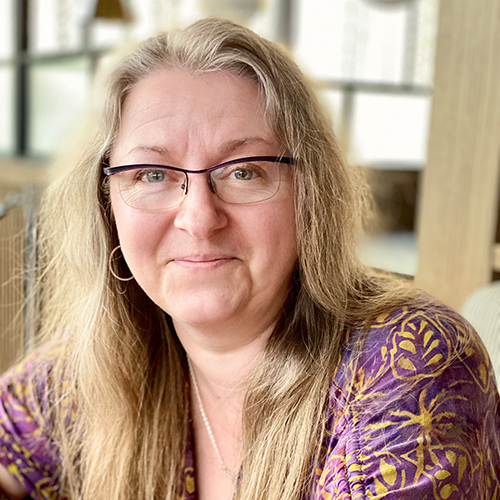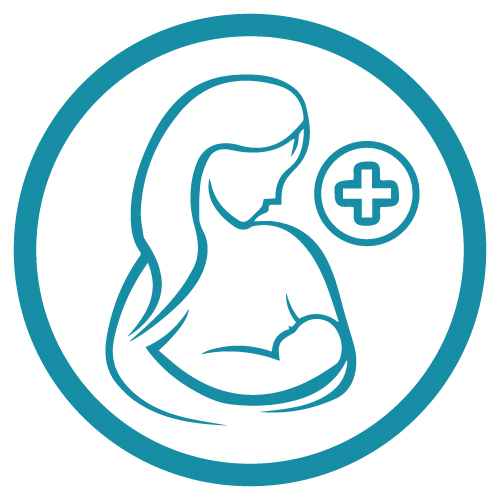 IBCLC Detailed Content Outline: Techniques Focused CERPs - Section VI
IBCLC Detailed Content Outline: Techniques Focused CERPs - Section VI
Access CERPs on Techniques for the IBCLC Detailed Content Outline recertification requirements. Enjoy convenient on-demand viewing of the latest Techniques focused IBCLC CERPs at your own pace.

Breastfeeding and Cranial Nerve Dysfunction – the what, who and why of Cranial Nerve Dysfunction in the newborn to precrawling baby

Michelle has been a pediatric neurodevelopmental Occupational therapist specializing in precrawling infants for over 26 years. She has specialty certifications and training in lactation, manual therapy, and pre and peri natal psychology. Michelle has specialized in optimal cranial nerve function and oral restrictions, with an emphasis on infant movement, innate biological imperatives and human potential, providing novel curriculums, support and resources for both professionals and parents. She enjoys collaborating and working in teams for babies and families going through the tethered oral tissues release process.
Topic: Breastfeeding and Cranial Nerve Dysfunction – the what, who and why of Cranial Nerve Dysfunction in the newborn to precrawling baby - [View Abstract]
Topic: Compensatory vs Novel Movements: 3 Keys for Babies With Tongue, Lip and Buccal Restrictions - [View Abstract]
Topic: Interoception: Beyond the Homunculus....The Real Sixth Sense and Its Primary Function as Sensory Input to the Autonomic Nervous System - [View Abstract]
Topic: The Vagus Nerve: Branchial Motor / Special Visceral Efferents: The Pharynx, Larynx, Soft Palate and one tiny tongue muscle - [View Abstract]
Topic: TummyTime!™ : A Therapeutic Strategy for Parents and Babies - [View Abstract]
Cranial Nerve Dsyfunction, CND, is a term used to describe a disruption, dysregulation or dysfunction in one or more cranial nerves in the precrawling period. Cranial Nerves are twelve, paired nerves, ten of which originate in the brainstem. They mediate all incoming sensory input and also help regulate, move and maintain the health of the muscles of the face, head, neck, jaw, tongue and throat. From sensing mother’s smell, touch, taste to rooting, latching and coordinating suck/swallow/breathe patterns, optimal cranial nerve function is paramount. Lactation consultants need to be able to identify CND, identify a couple of treatment interventions and know when to refer to appropriate health care professional such as OT, PT, Speech, or Manual Therapist/Bodyworker. CND explains how many tongue/lip tied babies who have had a frenotomy continue to struggle significantly with the activities and movements of optimal breastfeeding. Michelle will cover the basics of CND, a simple classification system, and her 4 Principle Functional Movement Protocol, which she states can optimize cranial nerve function in the precrawling baby and improve breastfeeding outcomes.

Antenatal Breastmilk Expression: Setting Families Up For Success

Mariana Colmenares Castano was born in Mexico City, and from an early age she was fascinated by animals and nature.She studied medicine at the National University of Mexico (UNAM), and foundher passion as a pediatrician doing her residency at the National Pediatric Institute. When her first child was born she witnessed the lack of knowledge and commitment to breastfeeding within the medical profession, and so she decided to specialize in breastfeeding medicine. She certified as a Lactation Consultant (IBCLC) in 2011.Mariana is a member of the International Lactation Consultant Association, the Academy of Breastfeeding Medicine, and a proud founding member of the National Lactation Consultant Association of Mexico (ACCLAM), where she served on the Board of Directors as Education Coordinator (2014-2019). She is part of board director for the Academy of Breastfeeding Medicine for a 3 year period (2019-2022) and recently named as secretary for the Academy of Breastfeeding Medicine. Mariana is a member of the team for Breastfeeding Country Index BFCI, a project from Yale University and Universidad Iberoamericana. She is consultant for the National Health Institute in Mexico and has collaborated with UNICEF in breastfeeding projects and part of the steering committee for the WHO. She has spoken at national and international conferences, co-published numerous articles and co-authored a chapter for the National Academy of Medicine. At the moment she is a Clinical Fellow in Community Paediatrics in London.
Topic: Breastfeeding The Baby With Congenital Heart Disease - [View Abstract]
Topic: Breastfeeding with Insufficient Glandular Tissue - [View Abstract]
Topic: Clinical Assessment and Management of Jaundice in the Newborn - [View Abstract]
Topic: Oral Colostrum Care as an Immunological Intervention in the NICU - [View Abstract]
Antenatal breastmilk expression may be suggested to mothers, including mothers with diabetes and obesity to improve breastfeeding and maternal and infant outcomes postpartum. It can be a tool for use in these special circumstances, collecting colostrum prenatally can permit supplementation of newborns at risk for hypoglycemia at birth, reducing the use of formula. It is important also to know that teaching mothers hand expression techniques prenatally improves breastfeeding rates. Other clinical cases that can benefit from this practice are women with insufficient glandular tissue, polycystic ovaries, and mothers who have breast surgery. Learn more about the current literature on antenatal milk extraction, the complexity of labour induction and whether there is any truth to the belief that it is not possible to stimulate the nipples during pregnancy because it could start labor, and how and when to implement antenatal milk extraction in practice.

Beyond the Basics of Latch: Support Strategies for Helping Babies when the Basics Aren’t Enough

Melissa Cole, MS, IBCLC, RLC is a board certified lactation consultant, neonatal oral-motor assessment professional, and clinical herbalist in private practice. Melissa has been passionate about providing comprehensive, holistic lactation support and improving the level of clinical lactation skills for health professionals. She enjoys teaching, researching and writing about wellness and lactation-related topics. Melissa holds a bachelor of science degree in maternal child health and lactation consulting and her master’s work is in therapeutic, clinical herbalism. Melissa actively conducts research and collaborates with several lactation and health care professional associations. Before pursuing her current path, Melissa’s background was in education and cultural arts, which has served her well in her work as a lactation consultant and healthcare educator. She loves living, working and playing in the beautiful Pacific Northwest with her 3 children.
Topic: Beyond Fenugreek: An Individualized Approach to Dietary and Herbal Galactagogues - [View Abstract]
Topic: Beyond the Basics of Latch: Support Strategies for Helping Babies when the Basics Aren’t Enough - [View Abstract]
Topic: Common Infant Digestive Health Concerns and Useful Support Strategies - [View Abstract]
Topic: Connection and Care: Virtual Support for Tongue-Tied Infants - [View Abstract]
Topic: Feeding is Movement: Activities for Supporting Optimal Infant Oral Function - [View Abstract]
Topic: Infant Gut Health: Common Concerns and Useful Support Strategies - [View Abstract]
Topic: Infant Oral Assessment: Exploring Anatomy and Function Beyond the Frenulum - [View Abstract]
Topic: Low Milk Production Detective Work: Assessment and Care Plan Considerations - [View Abstract]
Topic: Nature’s Nurturers: Plant Medicine for Perinatal Mental Health - [View Abstract]
Topic: New Thoughts on Infant Pre and Post-Frenotomy Care - [View Abstract]
Topic: Placenta Medicine as a Galactogogue: Tradition or Trend? - [View Abstract]
Topic: Thinking Critically About the Use of Clinical Lactation Tools - [View Abstract]
Topic: Will It Hurt? Frenotomy Aftercare Strategies to Optimize Healing Outcomes for the Newborn - [View Abstract]
In a perfect world, every baby would latch beautifully right after delivery and breastfeed happily ever after. In reality what we often see is that most moms and babies need a little help to get breastfeeding off to a good start. Many dyads need a lot of help. And a few mother/baby pairs need a miracle to breastfeed successfully. How can we best help those tough cases? There are many reasons babies struggle to latch and feed well. Some issues may include structural issues, physical discomfort, respiratory concerns, medical issues, digestive issues, poor feeding tool choices, prematurity, etc. Many providers are frustrated when they are unable to help a dyad latch and feed successfully. This presentation will cover some reasons why babies struggle to latch and breastfeed well. We will go over cases that portray challenging situations and the assessment techniques and care plan strategies that helped. This session is designed to help providers implement critical thinking skills in order to think outside the box when it comes to difficult cases.

View Details / Enroll

Breaking the Silos: Understanding the Connections Between Labor Interventions and Lactation

Janiya Mitnaul Williams, MA, IBCLC,CLC, is an accomplished lactation consultant, advocate, and trailblazer in the field of perinatal health equity. With over 15 years of experience, Janiya has dedicated her career to supporting nursing families and driving positive change in lactation practices.
Janiya's educational background includes degrees in Speech-Language Pathology and Audiology, as well as Health & Wellness with a concentration in Human Lactation. This diverse knowledge base equips her with a holistic approach to lactation support, recognizing the unique needs of each individual and their family.
In March of 2020, Janiya made history by creating and establishing the groundbreaking Pathway 2 Human Lactation Program at North Carolina Agricultural and Technical State University (NC), becoming the first public Historically Black College and University (HBCU) to offer a lactation program. As the Director of this pioneering program, she has set new standards in lactation education and operates an Outpatient Community-Based Lactation Clinic, providing essential support to nursing families in the local community.
Janiya's visionary leadership extends beyond the university setting. As the Co-Chair of the Perinatal Health Equity Collective for North Carolina since 2022, she leads strategic initiatives to address disparities and promote equitable access to quality perinatal services. Her passion for social justice and commitment to advancing equity in perinatal care have made a profound impact on the field.
Additionally, Janiya serves as the Co-Coordinator for Doula Services at the Women's and Children's Center at Cone Health. In this role, she works tirelessly to ensure birthing individuals and their families receive compassionate care and invaluable resources throughout their journey.
Recognizing the need for representation and cultural inclusivity within the lactation field, Janiya founded the Mahogany Milk Support Group in 2015. This empowering initiative aims to promote, encourage, and normalize nursing for Black and Brown families. Her trailblazing efforts include being the first person of color and Non-Registered Nurse to be hired as a Lactation Consultant within Cone Health's hospital system.
Driven by a passion for diversity, equity, and inclusion in lactation, Janiya strives to promote better health outcomes for Black, Brown, marginalized, and underprivileged families, who often face significant lactation barriers. Her visionary leadership, dedication to lactation equity, and unwavering commitment to empowering nursing families have earned her recognition and respect within the industry. Through her pioneering work and advocacy, Janiya is making a lasting impact on the field of perinatal health equity, creating a more inclusive and supportive environment for all nursing families.
Topic: Breaking the Silos: Understanding the Connections Between Labor Interventions and Lactation - [View Abstract]
Birth and breastfeeding/chestfeeding are intimately woven together although many separate the two. One's labor and birth process however, have a direct impact on how their nursing journey begins. Naturally, most infants can independently progress through the fetal to neonatal transition and produce a baby-led latch within the first hours of life. However, the process of birth is often unpredictable and many birthing families are regularly faced with common or unexpected labor interventions that can adversely affect milk supply and the initiation and receptivity of breastfeeding/chestfeeding for the infant. Some of the most common interventions include: IV fluids, induction of labor, epidurals, and continuous electronic fetal monitoring. These maternity care practices come with unintended consequences that directly impact lactation. Furthermore, studies indicate that many of these interventions are done more for convenience as opposed to medical reasoning. In order to promote, protect and support breastfeeding/chestfeeding for birthing families, providers and other members of the healthcare team should be encouraged to work in tandem; using effective communication and facilitating open dialogue. By including families in every aspect of their birth and postpartum period, self-efficacy and confidence is increased and trust is developed, setting the foundation for increased initiation and duration of human milk feeding.

View Details / Enroll

Breastfeeding by the Numbers: What do They Mean and When are They Useful?

Barbara D. Robertson, IBCLC, has been involved in education for over 34 years. She received a Bachelor’s degree in Elementary Education in 1988 and her Master’s in Education in 1995. Barbara left teaching elementary students in 1995 to raise her two children. Barbara is now the Director of The Breastfeeding Center of Ann Arbor and of the brand new business LactaLearning.
The Breastfeeding Center of Ann Arbor will still continue to serve breast/chestfeeding families and now LactaLearning will be dedicated to all of Barbara’s professional lactation trainings. Barbara has developed two 95 hour professional lactation training, a group training and a completely self study training with Nancy Mohrbacher. Barbara’s idea of creating professional book groups has exploded with her hosting Making More Milk with Lisa Marasco, Supporting Sucking Skills with Cathy Watson Genna, Breastfeeding Answers, 2nd Edition with Nancy Mohrbacher, and new for the fall, Safe Infant Sleep with Dr. James McKenna. Barbara will be hosting a one day online conference in the fall with Lisa Marasco and Cathy Watson Genna using all of her tech savvy skills to make this a one of a kind experience. Barbara is also a speaker for hire on a wide variety of topics including Motivational Interviewing. Barbara volunteered for the United States Lactation Consultation Association as the Director of Professional Development for 4.5 years.
She just retired as Associate Editor for Clinical Lactation, a journal she helped create for USLCA. Barbara has free podcasts, a blog, and Youtube videos which can all be found on her websites lactalearning.com and bfcaa.com. She has written many articles as well. She loves working with parents and babies, helping them with breast/chestfeeding problems in whatever way she can.
Topic: Breastfeeding: Baby’s First Milestone - [View Abstract]
Topic: Clinical Assessment and Management of Low Milk Production - [View Abstract]
Topic: Deconstructing Online Messaging: Ethical Considerations - [View Abstract]
Topic: Milk Sharing and Milk Banking: Building Knowledge for Better Outcomes - [View Abstract]
Topic: The Baby's Not Gaining Weight! Now What? - [View Abstract]
Topic: The Great Nipple Shield Debate - [View Abstract]
Numbers are used all the time in the lactation field. Test weights, percentiles, % of weight gain, are just some of the information that is gathered to help make infant feeding decisions. But what are they really telling us? When are they useful? Using these numbers in a way that actually helps support and promotes breastfeeding are key. Appropriate infant weight gain, how to do a test weight, scale calibration, calculating infant intake, and the possible need for supplementation, will all be covered.


Barbara D. Robertson, IBCLC, has been involved in education for over 34 years. She received a Bachelor’s degree in Elementary Education in 1988 and her Master’s in Education in 1995. Barbara left teaching elementary students in 1995 to raise her two children. Barbara is now the Director of The Breastfeeding Center of Ann Arbor and of the brand new business LactaLearning.
The Breastfeeding Center of Ann Arbor will still continue to serve breast/chestfeeding families and now LactaLearning will be dedicated to all of Barbara’s professional lactation trainings. Barbara has developed two 95 hour professional lactation training, a group training and a completely self study training with Nancy Mohrbacher. Barbara’s idea of creating professional book groups has exploded with her hosting Making More Milk with Lisa Marasco, Supporting Sucking Skills with Cathy Watson Genna, Breastfeeding Answers, 2nd Edition with Nancy Mohrbacher, and new for the fall, Safe Infant Sleep with Dr. James McKenna. Barbara will be hosting a one day online conference in the fall with Lisa Marasco and Cathy Watson Genna using all of her tech savvy skills to make this a one of a kind experience. Barbara is also a speaker for hire on a wide variety of topics including Motivational Interviewing. Barbara volunteered for the United States Lactation Consultation Association as the Director of Professional Development for 4.5 years.
She just retired as Associate Editor for Clinical Lactation, a journal she helped create for USLCA. Barbara has free podcasts, a blog, and Youtube videos which can all be found on her websites lactalearning.com and bfcaa.com. She has written many articles as well. She loves working with parents and babies, helping them with breast/chestfeeding problems in whatever way she can.
Topic: Breastfeeding: Baby’s First Milestone - [View Abstract]
Topic: Clinical Assessment and Management of Low Milk Production - [View Abstract]
Topic: Deconstructing Online Messaging: Ethical Considerations - [View Abstract]
Topic: Milk Sharing and Milk Banking: Building Knowledge for Better Outcomes - [View Abstract]
Topic: The Baby's Not Gaining Weight! Now What? - [View Abstract]
Topic: The Great Nipple Shield Debate - [View Abstract]
Breastfeeding is widely acknowledged as being the healthiest way to feed an infant for at least two years. In the United States of America, the CDC 2014 Breastfeeding Report Card states that 79.2% of mothers start out breastfeeding. However, as the babies get older, these numbers plummet. Only 49.4% of these babies are receiving any breastmilk by 6 months of age. We know from the literature that the primary reasons mothers stop breastfeeding in these early months are pain and worrying about their breastmilk supply. These are problems with solutions if the proper support is in place. Why is this support lacking? Is it because for all of the talk, “breast is best”, the importance of breastfeeding is not really valued? What if successful breastfeeding was reframed into a milestone? Baby’s first milestone? This presentation will explore other milestones, walking, talking, and learning to read, and what happens if babies and young children are not reaching these markers in a reasonable time frame. What support systems are in place to help these milestones be achieved if babies are faltering? The possible reasons for a baby not being able to breastfeeding and possible solutions will then be examined from the lens of having proper support systems in place.

View Details / Enroll

Care Plan Development for Weight Concerns in the Breastfed Infant: A Family Centred Approach

Shel works part time for the NHS in northwest England, and has four adolescents.
In addition to this, she runs a small private IBCLC practice specialising in the unsettled baby, those with faltering weight and those who are formula fed, and also holds a variety of consultant and trustee roles in various national and international organisations for advocacy and education around infant feeding; these include being Clinical Director for the breastfeeding support app AnyaHealth, being co-chair of Nursing Matters, an advocacy organisation for the breastfed infant, and being vice-chair of the UK Association for Milk Banking.
Shel has been on the development committee for 3 NICE guidelines including one on Faltering Growth, has co-authored 3 Cochrane systematic reviews, and written a book “Why Infant Formula Feeding Matters” (2022). In 2021 Shel began work towards a PhD in further understanding how best to support families with unsettled babies in universal services, which she conducts part time alongside her other commitments.
She teaches in person and online, both in her NHS role and in the consultant roles, and thoroughly enjoys sharing the knowledge she has acquired to improve the experience of families everywhere.
Understanding how to develop effective and supportive evidence-based care plans for babies whose weight and/or growth is faltering, is absolutely key to the toolkit of those who are working with breastfeeding babies. Find out more in this presentation.

View Details / Enroll


Mary Ryngaert is a Pediatric Nurse Practitioner since 1987 and an International Board-Certified Lactation Consultant since 2000. She received her MSN in the Primary Care of Children at Catholic University in Washington, DC. In her clinic at the University of Florida, she sees families for breastfeeding issues for the duration of the breastfeeding journey and provides education for pediatric residents. She is active in the local breastfeeding coalition and serves as a consultant/coordinator for the hospital Baby Friendly program. She has a special interest in supporting the development of peer counselors, especially women of color, to provide breastfeeding support within the community. She served as the Chair for the National Association of Pediatric Nurse Practitioners (NAPNAP) Breastfeeding Special Interest Group for six years and is a delegate to the US Breastfeeding Committee for NAPNAP . She was a co-author for the 2018 update to the NAPNAP Position Statement on Breastfeeding.

View Details / Enroll

Clinical Case Studies: Ankyloglossia in Babies With Marasmus and Kwashiorkor

Okky Nafiriana, MD is a member of Praborini Lactation Team, Indonesia.
She believes breastfeeding is the best way to feed and nurture baby.
But breastfeeding not always comes easy. Experienced breastfeeding her 2 daughters who were born with tongue and lip tie, made her realize the problems came with the ties and support frenotomy.
She currently works as a lactation counselor in Permata Depok Hospital and Puri Cinere Hospital, Indonesia, where she meets parents and educates the benefit of breastfeeding. She loves to study and currently pursued her dreams to deepen her knowledge in lactation.
Ratih Ayu Wulandari, MD, IBCLC is a
member of Praborini Lactation Team, Indonesia.
She believes breastfeeding is the best way to feed and nurture baby, therefore she became a breastfeeding counselor in 2012 and then IBCLC in 2014.
Experienced breastfeeding her three tongue-tied babies, she understand the pain and support early frenotomy.
She is practicing frenotomy for tongue-tie and lip-tie in Puri Cinere Hospital Depok Indonesia and a private practice. Her publications are including articles for international journal and books for mothers. Japan society of ADEL acknowledges her as Specialist of ADEL (Ankyloglossia with Deviation of Epiglottis and Larynx).
Successful breastfeeding depends on an infant’s latching onto the mother’s breast correctly. A poor latch will cause insufficient milk transfer that will cause poor growth. Each type of mammals produces different components of milk which make it species specific, which adjust to their needs, growth rate and breastfeeding habits. Human breast milk has many benefits for human babies because it contains various substances both as nutrition and as protection.
The authors present two infants who suffered ankyloglossia, which hindered the baby’s ability to breastfeed and eat solid food. These babies were diagnosed with marasmus and kwashiorkor (severe malnutrition). After revision of both the lip- and tongue-ties, supplementation with pasteurized human milk donor, and good complimentary feeding the babies finally reach an optimal growth and development. Learn more about how these two cases were managed to bring the babies back to health.


Nancy Mohrbacher was born and raised in the Chicago area, where she lives today. She is a board-certified lactation consultant who has been helping nursing mothers since 1982. Her breastfeeding books for parents and professionals include Breastfeeding Answers Made Simple and its Pocket Guide; Breastfeeding Made Simple(with Kathleen Kendall-Tackett); Working and Breastfeeding Made Simple; and Breastfeeding Solutions and its companion app for Android and iPhone.
Nancy currently contracts with hospitals to improve breastfeeding practices, writes for many publications, and speaks at events around the world. Nancy was in the first group of 16 to be honored for her lifetime contributions to breastfeeding with the designation FILCA, Fellow of the International Lactation Consultant Association.
Topic: Applying Bioethics to Milk Banking and Milk Sharing - [View Abstract]
Topic: Concerns About Low Milk Production - [View Abstract]
Topic: Transitioning the Preterm Infant to the Breast - [View Abstract]
Topic: Using Gravity-Assisted Positions to Prevent Early Breastfeeding Problems - [View Abstract]
Topic: What Mothers Need to Exclusively Breastfeed - [View Abstract]
Topic: What's New In Lactation - [View Abstract]
This talk provides an analysis of the challenges associated with assessing milk adequacy during the hospital stay, the need for supplements, and when supplements are needed, recommended feeding volumes and methods. It also includes strategies for helping employed mothers use the Magic Number concept to keep milk supply steady long term and planning tips for the next baby when a mother had previous milk-production issues.





.jpg)












